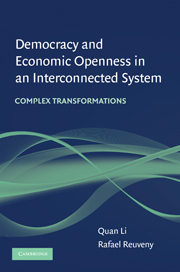Book contents
- Frontmatter
- Contents
- List of Figures and Tables
- Acknowledgments
- 1 Introduction
- PART I THE DEMOCRACY–ECONOMY NEXUS
- 2 Democracy and Economic Openness
- 3 Democracy, Economic Openness, and Income Inequality
- 4 Democracy and Development
- PART II BRINGING IN CONFLICT
- PART III BRINGING IN THE ENVIRONMENT
- References
- Author Index
- Subject Index
3 - Democracy, Economic Openness, and Income Inequality
Published online by Cambridge University Press: 05 June 2012
- Frontmatter
- Contents
- List of Figures and Tables
- Acknowledgments
- 1 Introduction
- PART I THE DEMOCRACY–ECONOMY NEXUS
- 2 Democracy and Economic Openness
- 3 Democracy, Economic Openness, and Income Inequality
- 4 Democracy and Development
- PART II BRINGING IN CONFLICT
- PART III BRINGING IN THE ENVIRONMENT
- References
- Author Index
- Subject Index
Summary
INTRODUCTION
In the previous chapter, we saw that the different aspects of national economic openness affect the level of democracy in a country. In that analysis, the level of national income inequality acted as a control variable in the statistical model of the sensitivity analysis. We found that a rise in the level of income inequality could reduce the level of democracy in a country. This chapter changes the causal arrow between income inequality and democracy, and we now focus on identifying the causes of national income inequality. We seek to study two interrelated important questions pertaining to this phenomenon: How does the level of economic openness of a country affect its distribution of income? How does the level of democracy influence a country's distribution of income? These two questions are very important for social scientists because a country with a highly skewed income distribution tends to be politically unstable. Political instability often may lead to intrastate conflict and ultimately civil war.
So far, these two questions of interest have been addressed in two separate bodies of literature. The effect of economic openness on the distribution of income has been debated in the literature on economic globalization (e.g., Rodrik, 1997; Held et al., 1999). The issue has also been debated in policy and popular circles (e.g., Soros, 1997; Wolf, 2000; World Bank Poverty Net, 2000).
- Type
- Chapter
- Information
- Democracy and Economic Openness in an Interconnected SystemComplex transformations, pp. 62 - 88Publisher: Cambridge University PressPrint publication year: 2009



